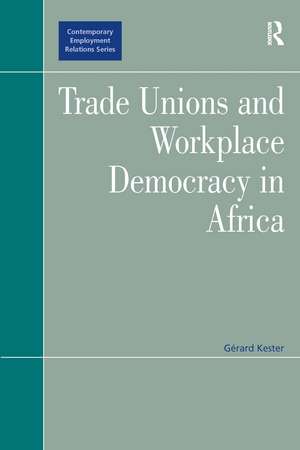Trade Unions and Workplace Democracy in Africa: Contemporary Employment Relations
Autor Gérard Kesteren Limba Engleză Hardback – 28 apr 2007
Preț: 770.45 lei
Preț vechi: 1106.45 lei
-30% Nou
Puncte Express: 1156
Preț estimativ în valută:
147.44€ • 160.10$ • 123.85£
147.44€ • 160.10$ • 123.85£
Carte tipărită la comandă
Livrare economică 23 aprilie-07 mai
Preluare comenzi: 021 569.72.76
Specificații
ISBN-13: 9780754649977
ISBN-10: 0754649970
Pagini: 346
Dimensiuni: 156 x 234 x 19 mm
Greutate: 0.8 kg
Ediția:1
Editura: Taylor & Francis
Colecția Routledge
Seria Contemporary Employment Relations
Locul publicării:Oxford, United Kingdom
ISBN-10: 0754649970
Pagini: 346
Dimensiuni: 156 x 234 x 19 mm
Greutate: 0.8 kg
Ediția:1
Editura: Taylor & Francis
Colecția Routledge
Seria Contemporary Employment Relations
Locul publicării:Oxford, United Kingdom
Notă biografică
Gérard Kester was formerly Associate Professor of Labour Studies at the Institute of Social Studies, The Hague, The Netherlands.
Recenzii
'This book has an astonishing depth and expanse, covering 10 countries and based on over twenty years of experience of research and implementation. It is also compelling in its coherent blend of theory, extensive empirical data and policy prescription.' Raymond Markey, Auckland University of Technology, New Zealand 'This study, splendidly written by one of the most prominent international experts in the field, is indispensable for everybody interested in the democratic future of Africa. I highly recommend it.' Manfred Weiss, Johann Wolfgang Goethe University, Frankfurt, Germany 'Kester's Trade Unions and Workplace Democracy in Africa makes an invaluable contribution to understanding contemporary labour relations in Africa, and sounds a clarion call for action to build a new partnership among government, business, and unions. Ashgate deserves to be commended for publishing such an important study, which certainly will find a well-deserved place in labour studies.' Labor History '...this is a well-written and clearly argued book. It will be an authoritative source of information for anybody interested in the development of participatory democracy in Africa.' African Affairs
Cuprins
Preface and Acknowledgements PART 1 INTRODUCTION 1 Post-independence Labour Relations in Africa 2 The Development of Workplace Democracy 3 A Theory of the Dynamics of Workplace Democracy 4 Studying Democratic Participation in Africa PART 2 LEARNING EXPERIENCES 5 Conditions of Work and Employment 6 The Trade Union Condition 7 The Struggle for Workplace Democracy in Togo, Burkina Faso, Mali, Guinea, Ghana and South Africa 18 Statutory Workplace Democracy in Zambia, Tanzania and Zimbabwe 9 Managerial Prerogatives Versus Participation Prerogatives 10 The Gender of Trade Union Democratic Participation in Ghana PART 3 POLICY CONCLUSIONS 11 Towards More Meaningful and Effective Workplace Democracy 12 Building a Trade Union Agenda Trade Unions and Workplace Democracy in Africa 13 Trade Unions and Workplace Democracy in a Globalising Economy
Descriere
Can democracy only survive if it is participatory? Is participatory democracy a prerequisite for sustainable development? Are trade unions the most appropriate body through which such aims can be implemented? These critical questions are tackled in Gérard Kester's book, Trade Unions and Workplace Democracy in Africa, which applies an unparalleled depth of research to these issues as they impact African nations.


















